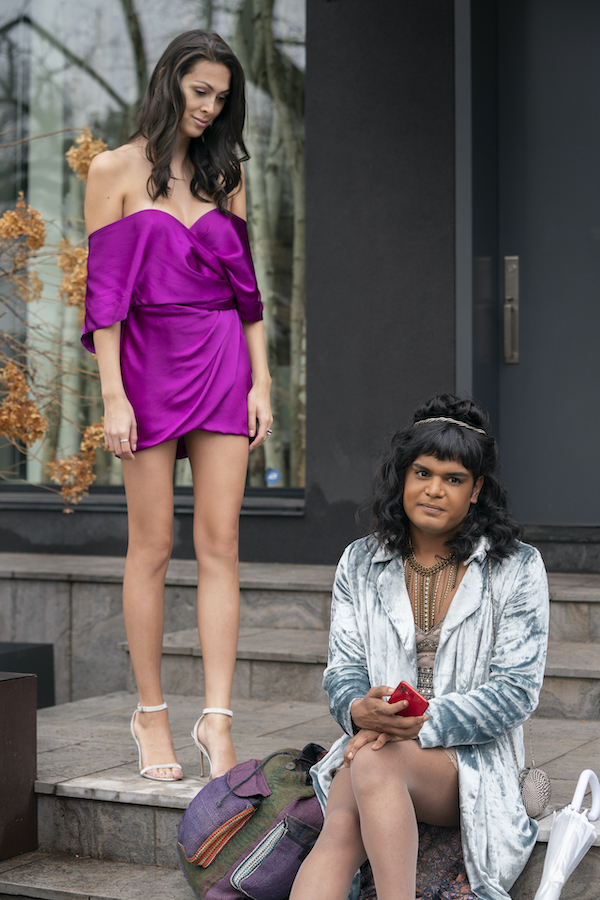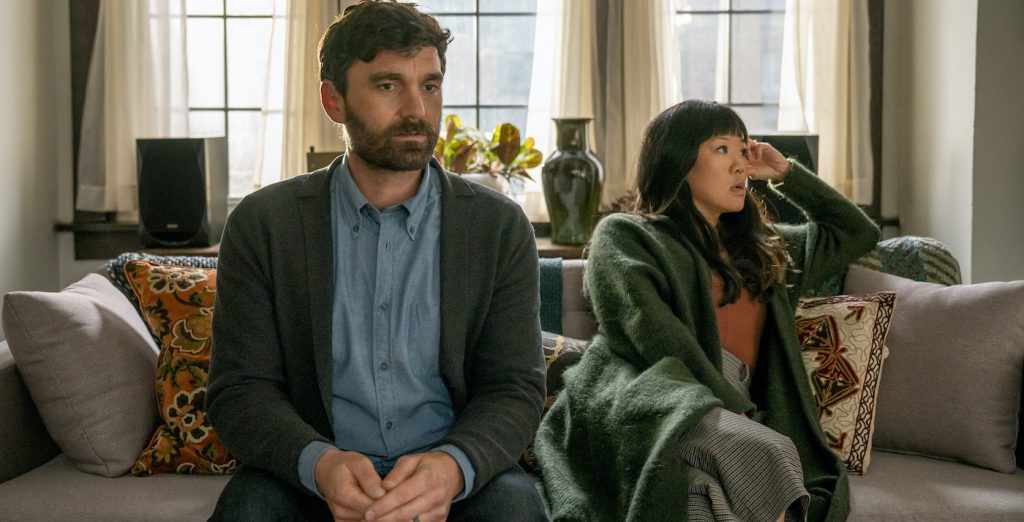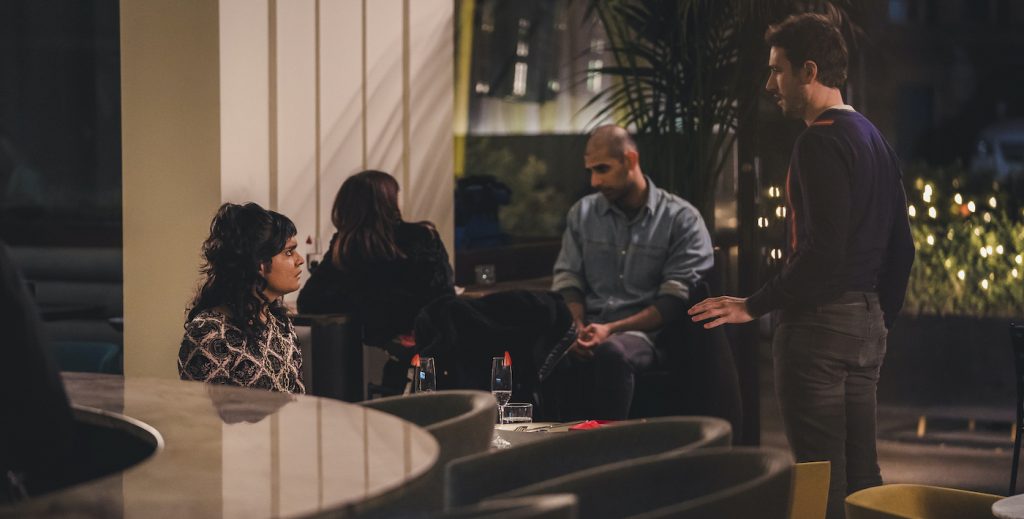“Sort Of” Co-Creator/Writer/Director Fab Filippo on This Groundbreaking New HBO Max Series
When you start watching the groundbreaking new HBO Max series Sort Of (debuting on HBO Max November 18), you might imagine that it’s yet another precocious-Millennial-auteur-driven show, starring its own creator/writer. After all, Sort Of’s real-life creator/writer/star, Bilal Baig, is a stylish, non-binary, Pakistani denizen of queer Toronto – just like Sabi Mehboob, the lead character they play in Sort Of.
As the story unfolds over eight episodes, however, it becomes clear that Sort Of is an ensemble show. The series traces the struggles of a racially diverse group of characters on the gender spectrum who pull apart and back together into a loving, tight-knit community. Sabi’s hard-won evolutions as a trans person exist on a continuum of human experience.
“Every person is constantly growing into another version of themselves, and another and another. We are all in transition. It’s the most natural thing in the world,” says Olympia (Cassandra James), Sabi’s trans love interest in Episode 7. “Just don’t skip your hormone pills. That feels very unnatural.”

Olympia’s words to Sabi are ideologically brave (and illustrate how well the show’s writing gets its dramatic tone right). Not everyone, progressive or right-wing, may agree that trans experience ought to be compared to other kinds of life transitions. The arresting moment also reflects the collaborative—rather than solo virtuoso—origin that animates Sort Of.
The series is, in fact, the brainchild of two people: Baig and Fab Filippo (Save Me), who is credited as creator and writer, and directed the show. Baig and Filippo met when they were both doing a play at Toronto’s legendary Tarragon Theater. “We weren’t the leads of the play, so we had a lot of offstage time,” says Filippo with a laugh. “We both had our laptops open, and we were both writing.”
At first, Filippo, who has been working in U.S. and Canadian TV, film, and theater for several decades, fell into a mentor role with the younger, aspiring Baig. But soon they were meeting at Toronto coffee shops and throwing ideas around that they might work on together. Eventually, Filippo proposed that they write a show based on a Baig-like character. “[Baig] said, ‘Ok, but why would I write that show with you?’” Filippo recalls.
At the time, Filippo was having something of a life/identity crisis. He returned to Baig with another idea. “I said, ‘What if we made a show about how everyone is in transition and that not every transition is the same, and that not every transition is seen or treated the same on a societal level?’ ” It was the seed of what Olympia says to Sabi, as Sabi struggles with their traditional Pakistani family.
Baig only had one question: “ ‘OK, If I’m me in the story, who are you?’”
Although played by actor Gray Powell, in the script Filippo “is” Paul, the cis-gender dad for whom Sabi works as a nanny. (Baig worked as a nanny for a downtown Toronto family.) With two key characters in place and a deeply felt philosophy underpinning their project, “story just felt like it was falling from the sky. It was really easy to come up with arcs and more characters and one thing linked to another. It’s amazing what happens when you turn the key, when you get the right elements that sort of make the world easy to build,” Filippo says.

That world includes Sabi’s appealingly narcissistic cis-gender boyfriend/ex/stalker; hilariously and perpetually outraged mixed-race lesbian best friend who insists they move to Berlin; nosy but loving traditional mother who is getting dangerously close to finding out that Sabi is non-binary; and the progressive mixed-race family that Sabi works for that threatens to engulf Sabi in a tragic crisis.
Filippo points out that Sabi is intentionally “the least explode-y” of all of Sort Of’s characters. Baig and Filippo wanted to write a trans character “that wasn’t depicted the same way that trans characters tend to be depicted in media, which is either sort of broken, or in danger of some kind, or addicted to drugs, or overly sexualized.”
Indeed, a gentle, sweet tone permeates the series. (American viewers may just assume that it’s a Canadian thing. As one character quips, “Canada is just America after a ton of therapy.”) Filippo says, “It emanates from that notion that the world would be slightly gentler because we wanted to show the world being gentler for [Sabi]. When you look at the plots, it’s not particularly gentle, but the way we handle them, we don’t go for the jugular, the darkest part of it.”
The reluctance to go dark distinguishes the series from its most obvious antecedent, Transparent. “Transparent obviously came up. How could it not?”, says Filippo. Sort Of is, by design, less focused on gender transition itself as a subject. “I know that what’s important to Bilal is creating a lead who we felt was just kind of trying to make rent, and keep their job, and figure out how to fall in love,” he says.

As much Baig and Filippo fused their creative energies, the latter says that they maintained some separate creative zones. If Filippo pitched an idea about a trans character that didn’t feel right to Baig, Filippo would drop it. Filippo, on the other hand, had greater say over the overall tone necessary to balance the elements of a dramedy. “We’ve never argued or fought over any kind of particular point. We value the partnership over any individual ideas,” he says.
The Sort Of production went to great lengths to ensure the show met its representational challenges. Not only did the real-life writers’ room reflect the racial and gender diversity of Sabi’s fictional Toronto community, the production employed consultants on transgender representation. The consultants wrote reports on the scripts and the episode rough cuts. One consultant, who was also a trans psychiatrist, wrote in a report that “this show is going to save some lives.”
Just the recollection of reading those words moves Filippo. At the time, he says, “We were like, What? That’s crazy. It seems crazy to even wrap your head around that kind of thing, to be honest. I’m not saying we approached [the show] doing that, but it was definitely a moment where I cried after I read that.”
Featured image: Bilal Baig, Kaya Kanashiro, Aden Bedard. Photograph by Courtesy of HBO Max



